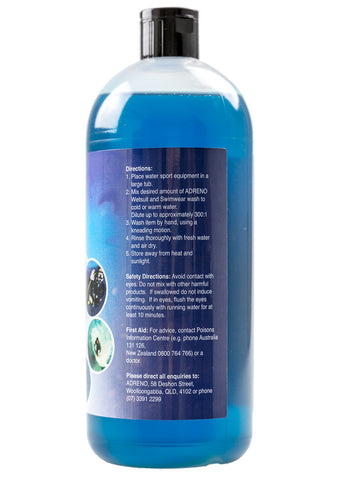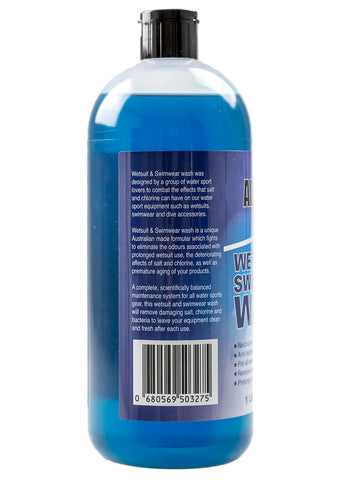Wetsuit Wash FAQ
1. What is wetsuit wash?
Are you after our guide to wetsuit washing and maintenance?
Wetsuit wash is a gentle cleanser that is designed to thoroughly clean away any dirt, bacteria, salt or chlorine from wetsuits without damaging the neoprene.
Wet suits are made from Neoprene [which is a Dupont trademark, so really, no wetsuits are made from actual Neoprene], and this guide will teach you how to use wetsuit wash to clean your wetsuit. The Neoprenetrademark is representative of the two materials that make up wetsuits: the inside material is a foamed-rubber known a Polychloroprenewhich is then sandwiched between the outside material: Elastane [trademarks for this material include Lycra and Spandex].
The final product offers immense stretch, thermal protection and memory but, depending on density of the Polychloroprene, can be chemically fragile. This means regular household soaps and cleaners are often far too harsh for neoprene and can cause it to dry out, become brittle and cease functioning. Read our full guide to wetsuit maintenance guide!
You may notice that Wetsuit Wash is now blue - this is our new and improved shampoo formula!
2. How do I use wetsuit wash?
For most uses simply fill a sink or bucket with 1 part Wetsuit Wash to 300 parts water. Submerge your items and ensure that the wash has complete coverage of the wetty both inside and out. Gently kneed the suit in and out of the water, ensuring that you squeeze the wetsuit as you go, this will ensure the wash can penetrate the jersey and wash the bubbles within the wetsuit's core material. If you have been using your wetsuit in chlorine treated swimming pools then it is a good idea to soak the suit first in cool, fresh water before you wash it. This will help to remove chemicals that may over-power the wetty wash. Don’t scrub the wetsuit as this can leave marks in the neoprene.
3. What is wetsuit wash made from?
Wetsuit wash contains gentle cleansers and also antibacterial ingredients that can help to eliminate microorganisms picked up through use. It is important to choose a wetsuit wash that is biodegradable and alcohol free. Wetsuit wash is also gentle on the skin as it contains no harmful chemicals and can safely remove salt, chlorine and bacteria without harming neoprene.
4. How do I get stains out of wetsuits?
Some substances such as sunscreen or oil and tar in the water can stain wetsuits. You must never use bleach or any harsh chemicals to try and get these stains out as this will damage the neoprene, neoprene is a high-strung material that demands careful treatment. Avoid scrubbing the neoprene with a stiff brush as this can rub away some of the material and cause weak spots. If you do have a stain on your wetsuit directly apply wetsuit wash on the area and then gently rub with a cloth or soft-bristled brush Wash thoroughly and repeat if necessary.
4. What is the quickest way to wash a wetsuit?
If you use your wetsuit a lot then you could get fed up of washing it all the time. If there are outdoor taps or showers when you come out of the water then take a wash whilst still wearing the wetsuit. This is a quick and easy way to get most of the dirt and salt off your suit. Another quick way is to hang it up in your garden and hose it off with fresh water. If you do this then you should also give the wetsuit a more thorough wash now and again with proper wetsuit wash just to keep it feeling fresh and smelling nice.
5. Why should I wash my wetsuit?
Wetsuits are just another form of sports apparel. Putting wetsuits away without washing them is not different than putting a pair of dirty gym shorts away. Wetsuits get some hard use when they are in the water and skin oils, sweat, salt and chemicals can all affect the fabric lining and neoprene. It is important to clean your suit after you have worn it in the water. Salt, bacteria and chemicals can all work to degrade the neoprene and this can cause it to wear more quickly. It will also start to smell after a while if you don't wash it thoroughly.
6. How do I dry my wetsuit?
You should never put a wetsuit away damp as it this will encourage bacteria and moulds to grow. Your wetsuit will soon start to smell and this can be very unpleasant when you next want to wear it. You can dry wetsuits by hanging them up (using a padded hanger) in a well-ventilated place out of the sunlight. You can also buy special wetsuit driers and this is a good idea if you use your wetsuit a lot or have a lot of wetsuits you need to dry. Never put a wetsuit in a commercial tumble dryer. These are too hot and will damage the synthetic neoprene rubber.
Check out our range of specialised wetsuit hangers.
7. Can I use a washing machine to clean my wetsuit?
If you use your wetsuit frequently and replace it every year then you could use a washing machine to keep it clean, because your wetsuits are not going to last very long anyway. Washing machines damage neoprene so, if you must, do need to make sure you only use a slow spin cycle and a cool wash. Don't put anything else in with the wetsuit that could damage it whilst the machine is spinning. You will not be able to use standard washing powder as this is too harsh for neoprene. Instead use a proper wetsuit wash and around a capful per wash should be sufficient.
Hire centres often use washing machines to keep suits clean as their wetsuits don't last long anyway and it is more important they are cleaned quickly and thoroughly ready for the next wearer.
8. Can I dry my wetsuit in the sun?
Neoprene is vulnerable to UV radiation so you do need to be careful when drying or storing wetsuits made from this synthetic material. You can dry wetsuits in the sun but make sure you don't leave them out for more than a few hours and turn the wetsuit part way through drying. UV light can cause neoprene to age and this will make it become brittle and prone to cracking much more quickly.
9. How do I care for the zip on my wetsuit?
One of the first things to go on a wetsuit can be the zip and by rinsing the zipper with fresh water, or better yet wash it with Wetsuit Wash, and your zip will be prime. A little trick handed down from the Old Blokes is to wash a zipper with boiling water, works great on a board bag but be careful splashing boiling water on your wetty! Make sure you only store your wetsuit flat or hanging straight from a hanger. Folding your wetsuit can not only cause creases in the neoprene but you could also bend the teeth on the zip. When you clean your wetsuit use some proper wetsuit wash and gently brush out the zip to ensure you remove any grit or sand. This can damage the teeth the next time you zip up your suit. You can lubricate the zip and keep it working smoothly with some beeswax. Avoid using any oil based lubricates. These can actually attract and trap grit and sand.





